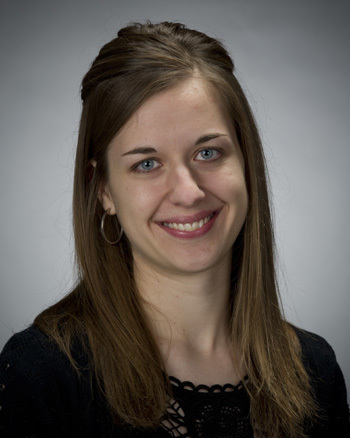
Biological sciences graduate student Kelsey Weigel has been invited to present her research at the 2015 St. Jude Children’s Research Hospital National Graduate Student Symposium in Memphis, Tenn. from April 7-11. The application process to speak at the symposium is highly selective; the event is not advertised and students can only apply if they have been nominated by a St. Jude representative or faculty advisor. Of the 1,815 students invited to apply, Weigel was one of 44 students selected to participate in the symposium.
A fourth year graduate student the lab of Zachary Schafer, the Coleman Assistant Professor of Cancer Biology, Weigel studies how the tumor microenvironment contributions to the progression of breast cancer. Specifically, she looks at the proteins secreted by carcinoma-associated fibroblasts (CAFs) and studies how they contribute to epithelial cell survival in detachment. Surviving while detached from the extracellular matrix is paramount to the survival of cancer cells in all stages of the metastatic cascade. Weigel’s research has identified a unique and novel mechanism by which CAFs secrete IGFBP-2 and ultimately promote epithelial cell survival in detachment. These data were validated using a mouse model, as she has demonstrated that the absence of CAF-derived IGFBP-2 results in a less severe tumor burden in the mouse. “Our data supports the notion that IGFBPs could be novel targets for new chemotherapeutics,” Weigel explained. “Such advances have potential to be especially important in treating metastatic disease.”
“This is a well-deserved honor for Kelsey,” said Schafer. “She has done some really remarkable work in the lab, and I am thrilled she has the opportunity to share her findings at St. Jude.”
Founded in 1962, the mission of St. Jude Children’s Research Hospital is to advance cures, and means of prevention, for catastrophic pediatric diseases through research and treatment. All children are able to receive treatment, regardless of a family’s ability to pay for the medical services.
Originally published by at science.nd.edu on January 27, 2015.